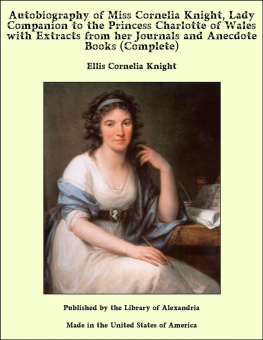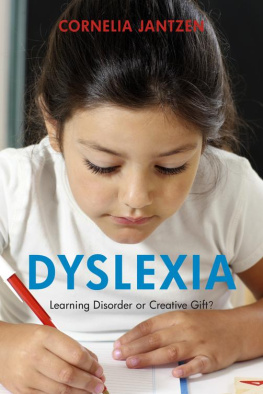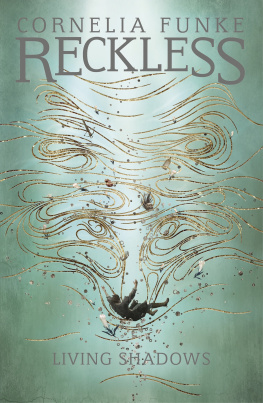The cover image was created by the transcriber and is placed in the public domain.
INTRODUCTION.
A book of this kind scarcely needs a sponsor. It carries the impression of its authenticity on every page. A few words, however, may be said about the circumstances of its publication. In the expectation that I should find in them materials for an interesting work, the papers from which these volumes have been compiled were given to me, some years ago, by the family into whose hands they passed on Miss Knights death. On examining them, I found that they consisted of a considerable number of journal-books, the dates of which covered more than half a century, and an unfinished autobiographical memoir, written principally on loose sheets of paper. The latter had obviously been commenced at a very late period of life, and had been interrupted by death. The Journals, however, supplied all that was needed to complete the Memoir to the very end of the writers life. Indeed, the continuous Memoir had been written from the Diaries, with only occasional additions supplied by the recollection of the writer, and was, in many places, little more than a transcript of them.
As I had no doubt that the Autobiography had been written with a view to publication, after, if not before, the authors death, I felt that in giving it to the world I should only be carrying out the intentions which, had she lived, Miss Knight would herself have fulfilled. And, on consideration, I could see nothing to be deprecated in the fulfilment of those intentions. It is true that a very considerable portion of the manuscript related to the private concerns of the Royal Family of England. But, even if the publications of Madame DArblay, Lady Charlotte Campbell, Lord Malmesbury, the Duke of Buckingham, and others, had not rendered all scruples on this score almost an over-refinement of delicacy, it was to be considered that nearly half a century had passed since the principal events recorded by Miss Knight had occurred, and that really those events, however private and domestic in their origin, had grown into legitimate history, and might properly be so treated. Indeed, it might fairly be questioned whether they could ever be considered as anything else. For, although I cannot subscribe to the doctrine that there is one Family in England which has no private history (such being the penalty exacted for its greatness), it is sometimes in the very nature of things that privacy is impossible, and that the affairs of royalty, whatsoever may be their delicacy, become public history before they are a day old. And it is so notorious that this was especially the case during the years of the Regency and the early part of the reign of George IV., that if it were not that the literary tendencies of the age are towards premature revelations, indicating a total disregard of the sanctity of domestic life, and that any kind of protest against it may do some good, I should have thought it altogether a work of supererogation to say a word in defence of the publication of such a Memoir as this.
Moreover, these volumes, though not the least interesting, are perhaps the most harmless of their class. Miss Knight was no retailer of prurient scandal or frivolous gossip; she had too good a heart to delight in the one, and too good a head to indulge in the other. Some, therefore, may think that she neglected her opportunities, and that her Memoirs are wanting in piquancy of revelation and vivacity of style. But it appears to me that the very simplicity of the narrative greatly increases its value. There is such an entire absence of everything like effort to produce effect, that the reader is irresistibly impressed with the conviction that he has before him the inornate truth, and that he may confide in every statement of the narrator.
Whilst, therefore, I had no scruples on the score of publication, I had, on the other hand, a very strong impression that by publishing these papers, and thus contributing an important addition to existing materials of history illustrative of the reign of George III. and the Regency, I should render a service to Literature and to Truth. But my time was engrossed by other occupations, and I know not when these volumes might have been prepared for the press if it had not been for assistance very cordially rendered by my friend, Mr. James Hutton, of whose intimate acquaintance with the social history of England in the Georgian era no better proof could be afforded than that which speaks out from his interesting volume on English Life A Hundred Years Ago. To him, indeed, is to be assigned any praise that may be due for the editing of these volumes, for his, in a much higher degree than mine, have been the intelligence, the industry, and the care bestowed upon them.
The story of Miss Knights life is soon told. The daughter of Admiral Sir Joseph Knight, an officer of well-deserved reputation, she was born about the year 1757. Her childish years appear to have been spent in London, where she received an excellent education, and made the acquaintance, as a girl, of Johnson, Goldsmith, Burke, Reynolds, and other celebrities of the age. In 1775, Sir Joseph Knight died; and shortly afterwards, Lady Knight, being in straitened circumstances, and having failed to obtain a pension from the Crown, turned her back upon England, and, taking Cornelia with her, travelled through France, and finally fixed her residence in Italy.
During a space of some twenty years after their departure from England, they appear to have oscillated between Rome and Naples, mixing in the best society of those cities, and seeing much both of the political and prelatical sides of Italian life. That in spite of these environments, Cornelia Knight remained both a good Protestant and a loyal Englishwoman we have the best possible proof in her Memoirs and Journals. Living in a revolutionary period, she had a hatred of revolutions, and was a Tory and a Bourbonite in every pulse of her heart.
At Naples, Lady Knight and her daughter became the familiar friends of Sir William and Lady Hamilton; and when, after the victory of the Nile, Nelson sailed into the Bay and delivered the Royal Family from the dangers which beset them, it was only consistent with the general kindliness of the heros nature that he should have taken a deep personal interest in the welfare of the widow and daughter of a brother officer. In return, Miss Knight celebrated his victories in patriotic verse, and was called by the naval officers of the time Nelsons poet laureate.
In 1799, Lady Knight died, at Palermo, and Cornelia, in fulfilment of her mothers dying injunctions, placed herself under the protection of the Hamiltons. In the following year she accompanied them and Lord Nelson to Englandbeing then about forty-two years of age.
In England she found many friends, with whom she had first become acquainted on the Continent, and the circle was soon widened, including in it some of the most distinguished persons of the age. In this society she did not move merely on sufferance. Miss Knight enjoyed at this time considerable reputation as a lady of extensive learning and manifold accomplishments. She had written some books, which, being in the stately classical style, hit the taste of the age; and she was celebrated for her extensive acquaintance with ancient and modern languages. Being a person of high principle, of a blameless life, and altogether a gentlewoman, it was not strange that, possessing also those intellectual gifts, and having numerous influential friends, she should have recommended herself, or been recommended by others, to the favourable notice of the Royal Family of England. Among her friends was Mr. Pitt, whose opinion it was that the education of the young Princess Charlotte of Wales could be entrusted to no fitter person.










